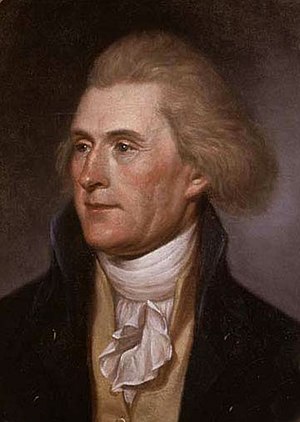 Image via Wikipedia
Image via WikipediaLess known than Gore's part is that played by none other than Thomas Jefferson, two hundred years before Mr. Gore.
By 1779, while the American Revolution was going full tilt, Thomas Jefferson, then a representative in Virginia's House of Delegates, submitted two proposals to the Virginia legislature. One was "A Bill for Establishing Cross Posts," intended to promote "the more general diffusion of public intelligence among the citizens of this commonwealth." He also introduced "A Bill for the More General Diffusion of Knowledge," with similar, but slightly different purposes. Implementation of either arrangement would require the state to invest in some infrastructure, at a time when funds among the states in the newly nascent nation were in severely limited supply.
General information, the type of communication that takes place between family, friends, and business people, could be handled by a well-designed postal system. But the purpose of cross posts was intended for the high-speed exchange of higher priority intelligence such as military data.
These plans were at first tabled by the Virginia Senate. Shortly afterward, by the end of 1779, Jefferson found himself unexpectedly elected governor. Discreetly, he refrained from using his greater authority to force adoption of his plan, reasoning that it had been the voted-on decision of the duly constituted legislature to reject the idea.
In 1780 the dynamics of the ongoing war changed. Communications between George Washington and Jefferson became unpredictable. Washington himself emphasized the value of establishing an efficient system of transmitting military intelligence as quickly as possible. As things were, it took over a month for decision makers to get word regarding the movement of soldiers, the outcomes of confrontations, and the needs for supplies. As a result, Jefferson's idea for establishing cross posts was revived and enacted.
Cross posts were mail route roads branching off the main north-south trunk road through Virginia, a sort of interstate highway of its day, connecting it with other American States. These roads created a flexible network, and constituted state-of-the-art communications technology.
Military intelligence was not to be carried by ordinary postal service. A special team of horses and riders were provided, along with a system of instructions for carriers, by means of which communiques were to be carried and handed off, with timed and dated receipts being required. These receipts were analyzed and used to predict delivery times with increasingly improved accuracy, or such was the theory.
Unfortunately for the war effort at that time, success of the system depended on couriers who were good at what they did, dedicated to the cause, and willing to shoulder their responsibilities seriously. Not all lived up to those standards, so the system didn't work as well as Jefferson had hoped. (Neither did a lot of things Jefferson thought up!)
Today the components that drive the modern Internet are well known. Messages are transmitted by means of data packets over networks of electronically connected devices such as routers, computers and cell phones, using a seven-layer stack of protocols. In Jefferson's day the same general objectives were accomplished by means of good roads, fast horses, and a system of rules for controlling the flow of messages.
Therefore, to anyone who cracks jokes regarding Al Gore's role in inventing the Internet, I will retort: No, it was really Thomas Jefferson who invented the Internet.
